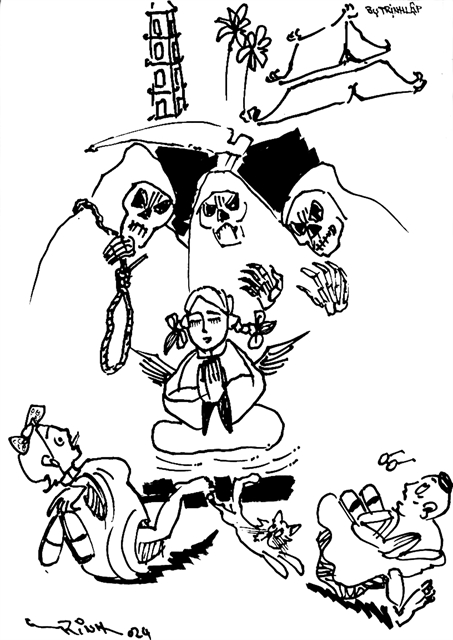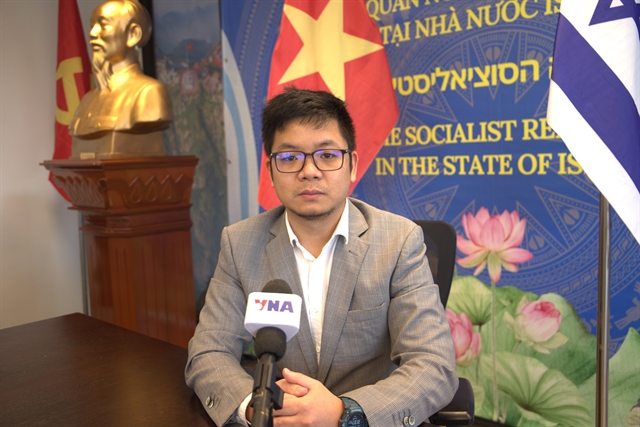 Talk Around Town
Talk Around Town

 |
| Illustration by Trịnh Lập |
by Nguyễn Mỹ Hà
Recent public outrage over a video clip taken at a summer camp in Ba Vàng Pagoda has led to the discontinuation of the programme. In the video, a monk was recorded teaching a teenager about a ghost that could enter your body and gain control of your actions, just like in the 1990 movie Ghost.
But this is reality in 2024, and it was a summer camp for adolescents.
"How could the parents send their kids to learn such crap?" was among the outraged comments under the video clip that went viral last week.
Sending children to summer camps at a pagoda or a monastery for a week or two is not new for busy working parents. During the two months of summer vacation, children get to go to one camp or two, and then have a couple of weeks to stay idle and free at home, and most are back at school again on August 1, though the official Back to School day is not until September 5 every year.
"I was hoping to have relief from school fees and extra classes fees," moaned my grocery store seller in our neighbourhood market. "But there are more expenses for summer, you know, swimming classes, camping classes, dancing classes. Oh, I'm dizzy with all the expenses."
It is true that children who go to public schools mostly only learn academic subjects. Sports, music or art classes are available but only at the bare minimum. If you want your child to play a sport, learn an instrument, or paint a picture, you'll need to send them to extra classes.
That's only art training. Today life skills are also needed to be taught: teamwork, survival skills, and how-to skills can all be woven into activities at a summer camp.
There are camps for children to explore nature, and camps for young firefighters and soldiers, where they mostly learn about discipline and respecting orders.
There are art and music summer camps where you get to sing in a band, play your instrument or sing and dance towards a final camp gala at the end.
Most camps require children to put their smartphones in a box, write their parents a letter to be sent to them after, and get the phone back on their return.
As parents, you need to check on the camp's staff, detailed programmes and activities. It's nerve-wracking at first as your 10-12 year-olds are not home for the first time, and you can only check up on them via a camp supervisor's daily report.
It's a bit different when you send your kids to a pagoda or a Catholic monastery, as the children will follow a strict daily routine: getting up early, making their bed, then activities together until the next meal.
In a pagoda, they tend to have vegetarian meals. When taught by Catholic nuns, they learn music, sewing or knitting. Many parents have said they are delighted with kids' camp. But newly learned habits are quickly lost to video games, YouTube, or social media scrolling.
Unless your family has religious connections, there are other summer camps to send your children to if you do not want them to have to live and learn religious teachings at such a tender age.
If parents want to practise a religion, they can do it themselves. My point is to give your children a normal upbringing, and when they grow up, they can choose to be whom they want and what to believe in.
I suggest that children grow up with healthy habits while maintaining a neat living space, but this is easier said than done; my teenage children would not keep their room as tidy as they should have.
They need to do household chores and be emotionally supportive when a friend needs them. You can never be available for your friends all the time, as you can never rely on friends all the time. It's about mutual help and support, not just one-way giving or receiving.
Getting out of their comfort zone, children can make new friends, share frustrations about parental nagging and discipline, and get respected by teammates and supervisors. They get to observe others' talents as well as demonstrate their own talent if they want to.
It's the parent's job to choose which type of camp will suit their child, as well as those that fit the family finances. Sometimes the children may like camps that are too expensive and are not as rewarding. Here, you should just say no and not feel guilty.
My kid used to go to a camp with 10 other children sharing a large room, and they had to sleep on the floor. They had activities during the day, outdoors, and under the sun, but for under an hour. I wasn't happy to learn about it at first, but after listening to my kid explain what they did, I found it quite educative.
Other parents may have different expectations, like the mother who took to social media to denounce camp organisers for making her child run in the sun, and sleep in a room with fans and not aircon, as if it were torture.
Each child is different, so ideally parents should know what suits their children the most and where to steer them to have a balanced, healthy and meaningful summer. VNS




